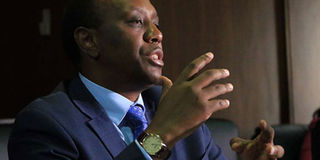PS Kaberia stumbling block for effective sports financing

Sports Principal Secretary Kirimi Kaberia addresses concerns from stakeholders when he appeared before lawmakers on October 11, 2018. He has been moved to the Tourism Ministry under a similar position. PHOTO | FILE | NATION MEDIA GROUP
What you need to know:
- While it has been projected that the fund has the potential to raise as much as Sh20 billion annually, this information has never been made public.
- MP Osotsi argues that the operations and management of the fund should be separated from those of the ministry, as the PS enjoys sweeping powers.
Parliament and sports bodies are accusing Sports Principal Secretary Peter Kaberia of failing the transparency test in managing the Sports, Arts and Social Development Fund, which is supposed to sponsor sports.
Now sports federations say their activities have been paralysed by lack of funding despite the existence of a national fund.
Last week, six federations appeared before the National Assembly's Committee on Sports and accused Mr Kaberia of denying them funding.
This came as the assets of the Kenya Rugby Union were auctioned over debt and the women’s and men’s football teams faced a lack of funds to participate in the 2020 Olympics and 2021 African Cup of Nations qualifiers, respectively.
The Fund was founded after the winding up of the National Sports Fund (NSF), which had been established to implement the Sports Act.
The NSF was steeped in controversy before it was abolished to pave the way for the new fund.
REVENUE STREAM
But the troubles of the sports bodies grew after the National Assembly amended the Act to transfer the fund’s management to the National Treasury, with the accounting officer in the Ministry of Sports as the administrator.
The NSF was supposed to support the objectives of the Sports Act, which included harnessing sports for national development, encouraging and promoting drug-free sport and recreation, facilitating the establishment of sports institutions, facilities, administration and management of sports.
The fund was to raise money from sports lotteries, investments and other payments to run sports.
After it was passed, the board of trustees was gazetted in June 2014 for a three-year term. But when their mandate expired in June 2017, the government did not replace them, until the board was abolished through an amendment to the Act in May 2019.
As a Vision 2030 project, NSF was expected to run a national lottery to create a reliable revenue stream for managing sporting activities.
But according to the report to Parliament, the request to the Treasury to provide the initial funds for the lottery was spurned, limiting its ability to fulfil that mandate.
FINANCING MODEL
By the start of 2018, NSF had run out of favour with the Treasury leadership, who engineered amendments to the Sports Act to abolish it.
Out went NSF and the Treasury proposed the establishment of the Sports, Arts and Social Development Fund to be managed in accordance with the Public Finance Management Act (PFMA).
Former Treasury Cabinet Secretary Henry Rotich picked Mr Kaberia as the administrator.
Section 24 of PFMA gives the Treasury CS the power to establish a public fund with the approval of the National Assembly.
Whereas under the Sports Act NSF was to run sports, the model of financing under the Sports, Arts and Social Development Fund was expanded to include all other social programmes, including arts, culture and universal healthcare.
The financing model has been an issue of concern among stakeholders.
Social development — which includes universal healthcare — is allocated an amount “not exceeding 60 per cent”; sports development is awarded an amount “not exceeding 35 per cent”, while an amount “not exceeding 20 per cent” is meant to promote the development of arts. Another amount “not exceeding five per cent” goes to “government strategic interventions”.
LACK OF TRANSPARENCY
The total worth of the kitty has never been made public. During debate on the amendments to the Act, MPs recommended that the fund apportion an amount “not less than 35 per cent” for the promotion of sports development to preserve the original aim of NSF.
While it has been projected that the fund has the potential to raise as much as Sh20 billion annually, this information has never been made public.
When he appeared before the House committee, Mr Kaberia ignored the question of the fund’s worth.
While amending the Act, MPs introduced a clause that required that the assets, liabilities and staff of NSF be transferred to the new fund.
But the PS sacked the staff last April, only retaining Mark Wambugu as the chief executive officer.
Mr Kaberia then moved the fund to his office at Kencom, from where Mr Wambugu runs it alongside Peter Ngetu, who was picked by the PS. From 35 staff, the fund is now managed by two people.
Nominated MP Godfrey Osotsi accuses the PS of undermining the national interest, saying: “There is no way the fund should be managed inside the PS’s office.”
GOOD GOVERNANCE
The lawmaker argues that the operations and management of the fund should be separated from those of the ministry, as the PS enjoys sweeping powers.
Whereas the PS is the accounting officer in the Ministry of Sports, his role as the administrator of the fund has been criticised as contrary to the tenets of good governance.
“We gave an individual powers to run the fund and now he behaves as if it is his personal property,” the MP said.
When Mr Kaberia appeared before the committee, he was roundly condemned by MPs as an unreliable public official.
“The PS is the head of cartels at the ministry and you better watch out,” said Webuye MP Dan Wanyama, accusing Mr Kaberia of paying Sh88 million to “his friends” to clear bushes for the building of a modern stadium in Marsabit.




